THE PEARLY GATES MARCHING BAND
Dean Norman came up with an unusual but very musical idea for the self-titled CD by The Pearly Gates Marching Band. He narrates what is billed as “a musical comedy” about a trad jazz band that plays at funerals for its members. The group gets smaller and smaller as the play progresses since one by one the musicians pass away. Despite the potentially downbeat topic, the narrative is upbeat and generally witty, with Norman joined by actors Phil and Carol Cartwright.
The full group (trombonist-leader-arranger Ben Herrick, trumpeter John Grafing, clarinetist Ray Heitger, banjoist Betsy Grafing, Andy Baker on tuba, and drummer Buddy Lopez) minus its pianist Rick Grafing (who is said to be the first to pass away) performs spirited versions of “Just A Little While To Stay Here,” “Just A Closer Walk To Thee” and a joyful “Oh Didn’t He Ramble” with vocals by Grafing and Nicole Heitger. After some narration about old-time jazz and the state of the band, the shrinking ensemble regroups at the trumpeter’s funeral with a second version of “Just A Little While To Stay Here,” “Precious Lord, Take My Hand” and a cooking “Fifty Miles Of Elbow Room.” Those performances feature excellent playing and interplay by clarinetist Heitzer and trombonist Herrick. The next “Just A Little While To Stay Here,” “The Old Rugged Cross” and “Over In The Glory Land” find the group reduced to a clarinet-tuba duet. Andy Baker on tuba soon becomes the last “survivor” and he gamely plays a bit of “Just A Little While To Stay Here” before he passes away. Some a capella singing sends him on his way before the full band regroups in heaven to perform a final hot version of “Just A Little While” while marching joyfully through the pearly gates.
While the play will probably not win any awards, it is fun and the hot jazz is excellent, no matter what the instrumentation.
The Pearly Gates Marching Band (Self-released, 23 selections, TT = 70:36) For more information write deannorman01@gmail.com
REMEMBER THE MUSIC
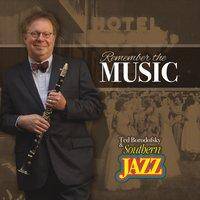 Veteran clarinetist Ted Borodofsky, in the liner notes to his recent CD Remember The Music, says that he recorded the 16 standards because he feared that most young listeners have never heard the songs before. Although they must certainly have heard “All Of Me,” “Who’s Sorry Now” and especially “Over The Rainbow” somewhere along the way, Borodofsky puts up a strong case. With the assistance of pianist Todd E. Hill (who arranged the music), guitarist Andy Brown (who has recorded several excellent CDs of his own), bassist Jim Wall and drummer Dean Hughes, Borodofsky creates tasteful and consistently swinging versions of the vintage material.
Veteran clarinetist Ted Borodofsky, in the liner notes to his recent CD Remember The Music, says that he recorded the 16 standards because he feared that most young listeners have never heard the songs before. Although they must certainly have heard “All Of Me,” “Who’s Sorry Now” and especially “Over The Rainbow” somewhere along the way, Borodofsky puts up a strong case. With the assistance of pianist Todd E. Hill (who arranged the music), guitarist Andy Brown (who has recorded several excellent CDs of his own), bassist Jim Wall and drummer Dean Hughes, Borodofsky creates tasteful and consistently swinging versions of the vintage material.
Ted Borodofsky has a relaxed swing style, an attractive tone and a thoughtful approach, even on the uptempo pieces. He always plays the melody fairly straight before launching into his improvisations. Hill and Brown contribute many concise solos while Wall and Hughes are excellent in support. Whether it is “All By Myself,” “Rosetta,” “Honeysuckle Rose” or “My Melancholy Baby,” Borodofsky creates a tasteful set of infectious swing.
Remember The Music (Southern Jazz SJ67890, 14 selections, TT = 58:07) www.southernjazz.com
MARTY ELKINS
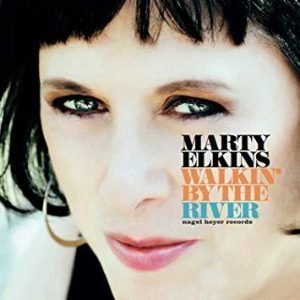 A fixture on the New York jazz scene since the 1980s, Marty Elkins sang at Jimmy Ryan’s and Eddie Condon’s establishment in their last days, worked with Max Kaminsky, was part of a few vocal groups, recorded with Dave McKenna, and has been a solo artist in a countless number of clubs. Her subtle yet direct singing approach combines with a fetching voice to create a memorable swing style.
A fixture on the New York jazz scene since the 1980s, Marty Elkins sang at Jimmy Ryan’s and Eddie Condon’s establishment in their last days, worked with Max Kaminsky, was part of a few vocal groups, recorded with Dave McKenna, and has been a solo artist in a countless number of clubs. Her subtle yet direct singing approach combines with a fetching voice to create a memorable swing style.
Ms. Elkins’ latest recording for the Nagel Heyer label teams her with trumpeter Jon-Erik Kellso, guitarist Howard Alden, pianist Steve Ash, bassist Lee Hudson, drummer Tayro Okamoto and occasionally organist Joel Diamond on 13 swinging numbers. Nearly all of the songs are from the swing era or earlier. Elkins who sometimes hints a little at Helen Humes and early Lena Horne, has a joyful sound and a real feel for these vintage songs. Kellso is a major asset throughout, whether playing introductions, interacting with the singer, or taking concise solos. Alden also has plenty of brief spots in the limelight, pianist Ash is often reminiscent of Count Basie and Diamond’s organ is mostly quiet yet uplifts the music.
Highlights of the easily enjoyable set include such numbers as “If I Could Be With You,” an uptempo “Runnin’ Wild,” the shouting “Garbage Can Blues,” and “When My Sugar Walks Down The Street,” although in reality all 13 performances are excellent. Anyone who is a fan of first-class swing singing will certainly enjoy Marty Elkins’ latest recording.
Walkin’ By The River (Nagel Heyer 119, 13 selections, TT = 61:07) www.nagelheyer.com
MILES AND MILES OF SWING
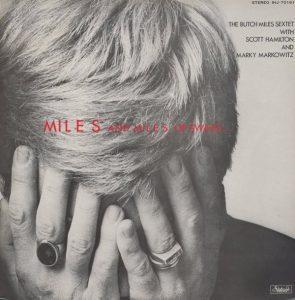 Considering his stature as one of the top swing-oriented drummers and one who uplifted the Count Basie Orchestra of the 1970s, it is surprising that Butch Miles has not led more albums in his career. While he led isolated sets for the Nagel-Heyer label in 1994 and 2003, all of Miles’ other records as a leader were for the tiny Famous Door and Dreamstreet labels during 1977-86. Harry Lim of Famous Door particularly enjoyed Miles’ playing, documenting him on as a leader on seven albums of which Miles And Miles Of Swing was the first..
Considering his stature as one of the top swing-oriented drummers and one who uplifted the Count Basie Orchestra of the 1970s, it is surprising that Butch Miles has not led more albums in his career. While he led isolated sets for the Nagel-Heyer label in 1994 and 2003, all of Miles’ other records as a leader were for the tiny Famous Door and Dreamstreet labels during 1977-86. Harry Lim of Famous Door particularly enjoyed Miles’ playing, documenting him on as a leader on seven albums of which Miles And Miles Of Swing was the first..
This fine set from 1977 teams the drummer with both Scott Hamilton and Al Cohn on tenors, flugelhornist Marky Markowitz, pianist John Bunch and bassist Milt Hinton. The recent reissue by Jazzology augments the original seven selections with three alternate takes and a previously unreleased version of “I Surrender Dear.” Miles has his share of solos space (being showcased on Basie’s “The King”) but also features his sidemen quite generously. While Hamilton and Cohn appeared on many sessions during the era (and the former is still a regular in the recording studio), Markowitz was heard much less frequently. After serving stints in the 1940s with the Charlie Spivak, Jimmy Dorsey, Sonny Dunham, Boyd Raeburn, and Woody Herman Orchestras, he became a studio and session musician who only infrequently was featured as a soloist. Fortunately Markowitz is on a few of Miles’ Famous Door dates and one of his own, and is heard in top form throughout this CD.
Such songs as “Cherokee,” a slower-than-usual version of “Take The ‘A’ Train” and “Broadway” all receive excellent treatment by these swing all-stars, all of whom play up to their high potential.
Miles And Miles Of Swing (Progressive 7163, 11 selections, TT = 60:17) www.jazzology.com
JAZZNOCRACY
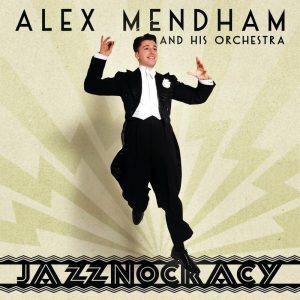 Several years ago, singer Alex Mendham realized his long-time dream of organizing and leading a jazz orchestra that performed music from the 1925-35 period, not only sounding but looking the part. They have since become the house orchestra at London’s Savoy Hotel and made their recording debut on Whistling In The Dark for the Rivermont label.
Several years ago, singer Alex Mendham realized his long-time dream of organizing and leading a jazz orchestra that performed music from the 1925-35 period, not only sounding but looking the part. They have since become the house orchestra at London’s Savoy Hotel and made their recording debut on Whistling In The Dark for the Rivermont label.
On Jazznocracy, the Alex Mendham Orchestra consists of nine horns (including bass sax), two violins and a four-piece rhythm section with either sousaphone or string bass. Mendham and the Dunlap Sisters (Serena and Hannah) take care of the vocals during a wide-ranging set that includes a few standards and many obscurities, ranging from hot dance music to a few sweeter tunes. While most of the arrangements utilize at least partial transcriptions from vintage recordings, many of these are little-known performances including by Herman Waldman, Ted Fio Rito, the Coon-Sanders Nighthawks, Ben Pollack (the classic “He’s The Last Word”) and Will Hudson along with Tiny Parham (the rollicking “Washboard Wiggles”) and Jelly Roll Morton (the atmospheric “New Orleans Bump”). The song selection is delightful for when was the last time that one heard such tunes as “Marbles,” “Gotta Great Big Date,” “On The Air,” “Cuttin’ Up,” or “Jazznocracy?” The brief solos very much fit the era as do Mendham’s versatile period vocals.
1920s/30s dance band collectors will enjoy the “new music” of Jazznocracy.
Jazznocracy (Rivermont BSW-2235, 17 selections, TT = 55:50) www.rivermontrecords.com
JAZZ CLASSIC OF THE MONTH
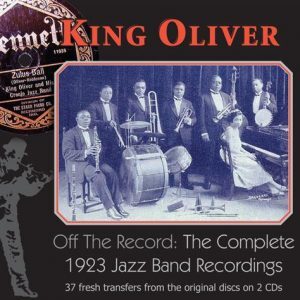 King Oliver’s Creole Jazz Band is rightfully one of the most celebrated of all New Orleans jazz bands. Their recordings from 1923 were groundbreaking. Not only were they the recording debuts of Oliver, Louis Armstrong and clarinetist Johnny Dodds but they are definitive examples of ensemble-oriented classic New Orleans jazz, certainly ranking as the most exciting and advanced jazz recordings up to that point in time. While the rapid evolution of jazz would soon find them being surpassed (only three years later) by Armstrong’s Hot Five recordings, the Creole Jazz Band sides would be among the main inspirations for Lu Watters’ Yerba Buena Jazz Band of the 1940s and countless other revivalist jazz groups. However there was always one flaw to the Oliver performances: the erratic and often-scratchy recording quality.
King Oliver’s Creole Jazz Band is rightfully one of the most celebrated of all New Orleans jazz bands. Their recordings from 1923 were groundbreaking. Not only were they the recording debuts of Oliver, Louis Armstrong and clarinetist Johnny Dodds but they are definitive examples of ensemble-oriented classic New Orleans jazz, certainly ranking as the most exciting and advanced jazz recordings up to that point in time. While the rapid evolution of jazz would soon find them being surpassed (only three years later) by Armstrong’s Hot Five recordings, the Creole Jazz Band sides would be among the main inspirations for Lu Watters’ Yerba Buena Jazz Band of the 1940s and countless other revivalist jazz groups. However there was always one flaw to the Oliver performances: the erratic and often-scratchy recording quality.
For the 2007 double CD Off The Record: The Complete 1923 Jazz Recordings, engineer Doug Benson did a remarkable job of remastering the Oliver recordings. For the first time, one can really hear what the Creole Jazz Band sounded like on pitch-corrected and mostly very clear recordings. Even those listeners who already have these timeless performances several times will want to get this twofer.
All 37 performances by Oliver’s band are here including such gems as “Canal Street Blues,” “Chimes Blues,” “High Society,” “Jazzin’ Babies Blues,” “Buddy’s Habits,” two versions apiece of “Dipper Mouth Blues,” “Snake Rag,” and “Riverside Blues,” and three of “Mabel’s Dream.” The interplay between Oliver and Armstrong (it is fun to guess who is playing what), the masterful playing of Dodds, and the fine ensemble work of trombonist Honore Dutrey and pianist Lil Armstrong are among the joys of these innovative and timeless recordings which can finally be truly heard. The accompanying booklet is also memorable. All serious early jazz collections simply have to include this version of this classic music.
In each issue of the Syncopated Times, this monthly column features reviews of CDs by classic jazz, 1920s and ‘30s, New Orleans jazz, Swing and Dixieland artists. A steady stream of rewarding releases comes out every week and I will endeavor to cover many of the best. If you wish to have your CDs considered for review or need liner notes, bios or press releases, feel free to drop me a line at scottyanowjazz@yahoo.com or send the music to Scott Yanow, P.O. Box 1220, Lake Hughes, CA 93532.
Since 1975 Scott Yanow has been a regular reviewer of albums in many jazz styles. He has written for many jazz and arts magazines, including JazzTimes, Jazziz, Down Beat, Cadence, CODA, and the Los Angeles Jazz Scene, and was the jazz editor for Record Review. He has written an in-depth biography on Dizzy Gillespie for AllMusic.com. He has authored 11 books on jazz, over 900 liner notes for CDs and over 20,000 reviews of jazz recordings.
Yanow was a contributor to and co-editor of the third edition of the All Music Guide to Jazz. He continues to write for Downbeat, Jazziz, the Los Angeles Jazz Scene, the Jazz Rag, the New York City Jazz Record and other publications.





















